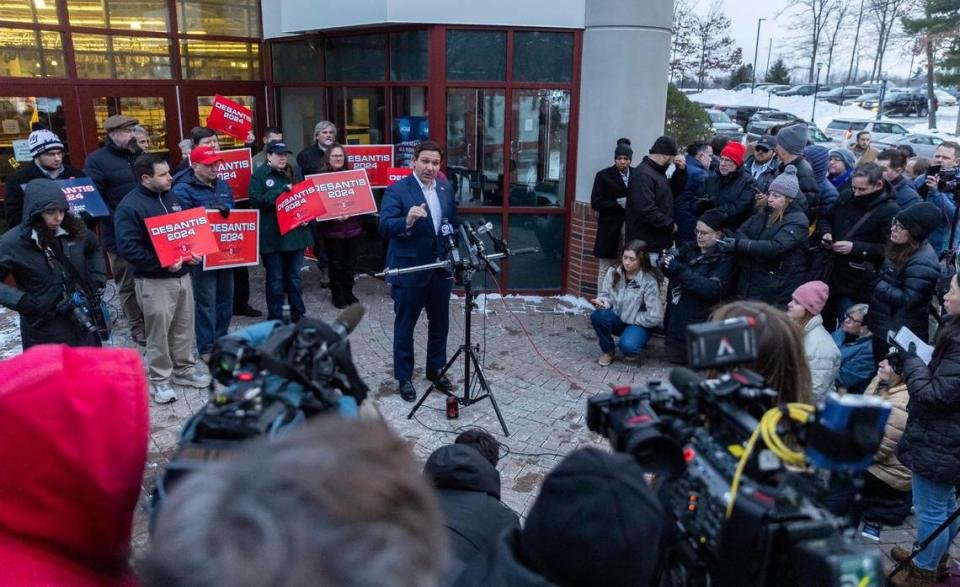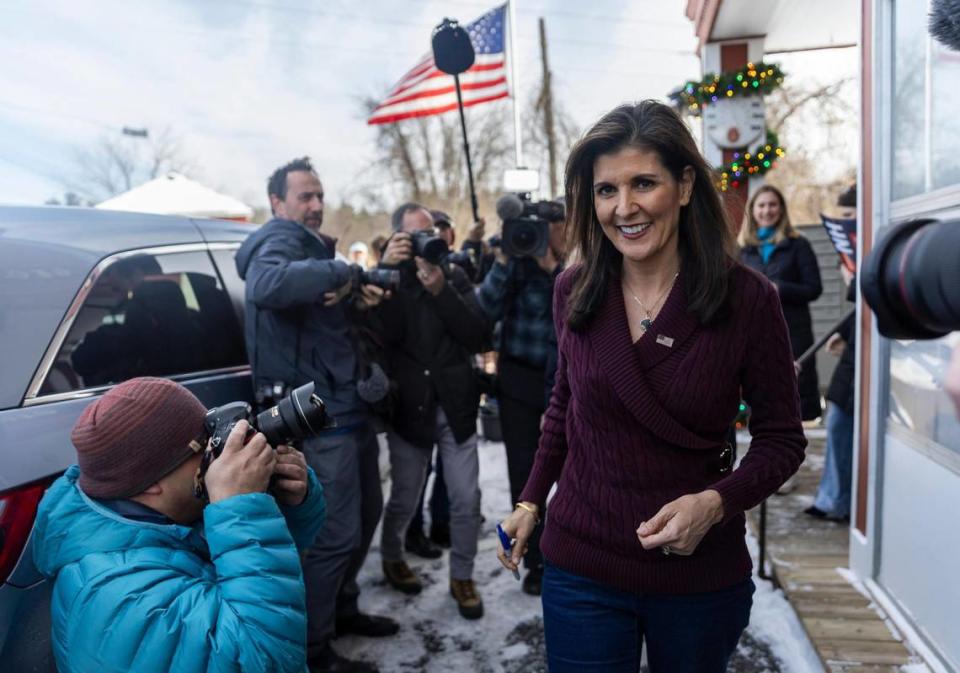DeSantis told Republicans that Trump was a terrible candidate. Then he got in line
- Oops!Something went wrong.Please try again later.
- Oops!Something went wrong.Please try again later.
A week ago, at a campaign rally outside Des Moines, Ron DeSantis let loose on Donald Trump, telling a packed room of supporters that the former president had no interest in rewarding conservative values and is only interested in one thing: personal loyalty.
“You can be the strongest, most dynamic, successful Republican and conservative in America, but if you don’t kiss that ring, then he’ll try to trash you,” DeSantis said at a banquet hall in Ankeny, Iowa.
But as he withdrew from the 2024 presidential race on Sunday, DeSantis puckered up.
In a video announcing that he was suspending his campaign, the Florida governor endorsed Trump, saying that while he had “disagreements” with the former president, Trump is a far better option than President Joe Biden.
“I signed a pledge to support the Republican nominee and I will honor that pledge,” DeSantis said.
DeSantis’ about-face makes him the latest Republican politician to warn of Trump’s shortcomings only to turn around and get behind the former president. But after a campaign that saw DeSantis steadily ramp up his attacks on Trump, getting back on his good side of a president with a penchant for holding both personal and political grudges could prove challenging.
Before dropping out, DeSantis accused Trump of not being “pro-life” during a nationally televised CNN town hall, faulted him for failing to deliver on his campaign promises during his time in the White House, panned him for his COVID-19 policies and warned Republican voters that nominating Trump would pave the way for Biden’s reelection.
“He definitely has to work for this,” Bryan Lanza, who worked on Trump’s 2016 campaign and remains close to the former president’s team, said of DeSantis. “He went after President Trump viciously.”
“Can he get back in his good graces?” Lanza asked. “I don’t know.”

READ MORE: 5 reasons DeSantis’ presidential campaign collapsed before the GOP’s first primary
DeSantis struggled throughout his campaign with how to approach Trump, who despite losing reelection in 2020 maintains an iron grip over the Republican Party’s conservative voter base. For months, the governor avoided going after Trump too directly, choosing instead to enumerate the ways in which he was different from the former president.
Meanwhile, the pro-DeSantis super PAC Never Back Down aired ads targeting Trump. One spot released by the group last summer used artificial intelligence to mimic Trump’s voice, while another ad blasted him for criticizing Iowa Gov. Kim Reynolds, who had endorsed DeSantis for the presidential nomination.
But ahead of the Iowa caucuses — the first-in-the-nation nominating contest on which DeSantis’ campaign had placed a hefty bet — the governor and his allies began sharpening their attacks.
At campaign events, he told voters that he would keep the promises that Trump had made and failed to deliver on. U.S. Rep. Thomas Massie of Kentucky, a key DeSantis ally who regularly appeared with the governor at his campaign stops, made a habit of drawing laughs from DeSantis’ supporters by impersonating Trump.
Two days before DeSantis dropped out, his campaign team, which in October launched a Trump “accident tracker” to highlight the former president’s missteps and slip-ups during his campaign speeches, mocked Trump for confusing Nancy Pelosi and Nikki Haley. “We could go with this or the 45 year-old in his prime,” stated a post by the @DeSantisWarRoom account on X.
RELATED CONTENT: DeSantis offered to ‘Make America Florida.’ Voters in Iowa and N.H. shrugged
In the hours after DeSantis ended his presidential campaign, Trump signaled that he’s willing to leave their rivalry in the past. His campaign said in a statement that it was “honored” to have DeSantis’ endorsement, while Trump told supporters at a campaign stop in New Hampshire on Sunday that he would stop referring to DeSantis as “Ron DeSanctimonious,” the nickname he had bestowed on the Florida governor.
Trump has put some campaign-trail feuds behind him in the past. After a bruising 2016 presidential primary fight against U.S. Sen. Ted Cruz of Texas, the two men developed something of an alliance during Trump’s tenure in the White House; Cruz largely voted in line with Trump’s agenda, while Trump – whom Cruz had called a “sniveling coward” after Trump mocked his wife – endorsed Cruz’s 2018 Senate reelection campaign.
The same was true for Trump’s relationship with U.S. Sen. Marco Rubio of Florida, whom Trump dubbed “little Marco” as the two competed for the 2016 nomination. Rubio, who’d told voters that Trump couldn’t be entrusted with a nuclear arsenal, endorsed him after dropping out, saying, like DeSantis, that he’d signed a loyalty pledge to back the Republican Party’s eventual nominee. (Former Florida Gov. Jeb Bush, who signed the same pledge when he ran for president in 2016, did not endorse Trump.)
Rubio endorsed Trump for the 2024 nod over DeSantis just before the Iowa caucuses.

Alex Conant, a Republican strategist who worked for Rubio’s unsuccessful 2016 presidential campaign, said that DeSantis’ decision to endorse Trump was mutually beneficial.
“Trump is eager to show a united party. That’s why he’s leaning very hard on elected politicians and failed opponents to endorse him,” Conant said. “On the other hand, I think Ron DeSantis wants to put presidential politics behind him as quickly as possible. He wants to endorse Trump and go back to Tallahassee and be governor, and dragging out his presidential campaign any longer isn’t in his interest.”
But both Lanza and Conant said that DeSantis’ failed presidential bid will continue to haunt him in one way or another. Conant said that DeSantis had largely “depleted his political capital” in Florida and nationally, and faces the difficult process of rebuilding his reputation. Lanza, on the other hand, said that DeSantis will need to rely on Trump to make up lost ground.
“I think it’s safe to say that unless Donald Trump tries to prop up Ron DeSantis, his political career is over,” Lanza said. “He has so alienated the base that it’s hard to see how anyone takes him seriously as a candidate going forward.”

